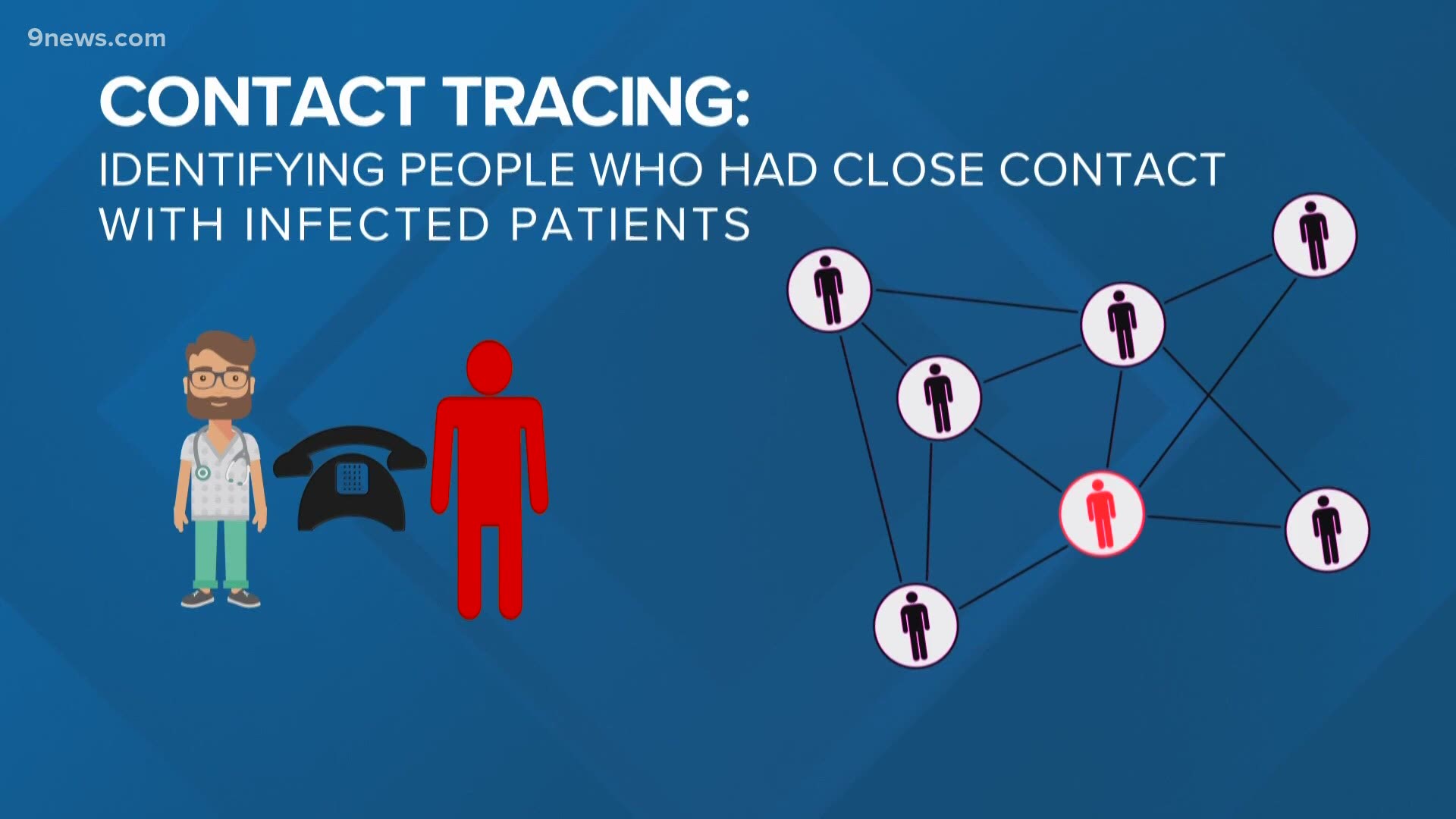COLORADO, USA — Contact tracers play an important role in Colorado's efforts to manage the spread of COVID-19.
9NEWS interviewed people involved in this work to learn more about what they do and why its important.
Rebecca Larson is an epidemiologist for Eagle County Public Health and Environment. She’s part of a five-person disease prevention team there investigating positive COVID-19 cases, monitoring people in isolation and quarantine and tracing their contacts. Her job involves collecting and sorting through a lot of data, as well as working with real people in sometimes very emotional situations.
Dr. Lisa Miller is a professor of epidemiology at the Colorado School of Public Health, which has partnered with the Colorado Department of Public Health and Environment (CDPHE) during this pandemic.
CDPHE said it's hired 25 students through the school to help with contact tracing efforts at the state level, in addition to the public health department’s 31 epidemiologists, who have been supporting local contact tracing efforts already.
(Editor's Note: The following responses have been edited for context and clarity).
9NEWS: What does a contact tracer do?
Miller: For infectious diseases, you want to identify the person who has the infectious disease. You want to make sure they are isolated from the population so they can’t infect other people. You want to carefully ask them about who else they’ve been in contact with so you can identify those people and quarantine them during the period they might become infectious. Then help both of these sets of people maintain this isolation or quarantine.
Larson: When we have a [COVID-19] case, first we do a case investigation. We’re talking to that person not only about their symptoms but were also asking them about potential exposures – how they were exposed, but also who have they been with, where they’ve been, who they’ve been with while they were potentially infections. Then ask them for the contact info for those contacts, then we follow up with the [additional] contacts.
What are these conversations like?
Larson: The majority of the time, it’s done on the phone, partially because it’s an infectious disease and we need to protect everyone involved.
These are difficult conversations, and people go through different emotions with you over the phone and being able to provide that space for them… Not being too robotic trying to get through your checklist, but feeling empathy and having compassion but also knowing we have a job to protect the public’s health too and balancing that.
Miller: Interviewing folks from different backgrounds takes a lot of cultural sensitivity. And I think we want to make sure that we are very aware of that and the training will also help students become aware of that.
Who are the contact tracers?
Larson: I’m fortunate that we have a team that we’ve been working together for many, many years. They are well-trained in infectious disease as well as contact tracing and having difficult conversations with people, especially over the phone and also developing trust with folks in a short amount of time over the phone.
Miller: These may be students who are concentrating in various areas of public health. They may be focused on epidemiology, so more than the quantitative side. They might be bio-statistician concentration, they might be interested in health policy. They might be more interested in community health. so they can come from a variety of backgrounds.
Many of these students [now hired by CDPHE] are interested in infectious diseases. And we have a particular infectious disease course so many of them have taken that… so they know a bit about infectious diseases and some of these concepts.
I think this will be an experience that will help people decide where they want to go into public health.
As counties begin to take steps to reopen businesses, why is this job important?
Larson: As were reopening businesses and people are going back to work, and hopefully were sustaining social distancing, but we know that were going to be increasing our contacts. So we expect that. We plan for that. We know that with every case, the number of contacts is likely going to increase now that people are interacting outside their homes more.
We’re not expecting to get to zero cases and stomp out a virus. We expect it to be at this low level, and that’s where we're wanting to keep it. That’s why case investigation and contact tracing is so important because we want to cut that thread of transmission… To cut the thread from continuing on, so we can continue to manage this lower-level of illness in this community.”
How many contact tracers are working in Colorado?
CDPHE said both state and local public health authorities handle contract tracing.
At the state level, CDPHE says its currently working to hire 25 more contact tracers (to bring the new hire total to 50). That's in addition to the 31 epidemiologists already working for CDPHE.
On Thursday, a spokesperson explained current contact tracing numbers by email:
“Because each local public health agency maintains their own staff, it is hard to know exactly how many employees are working on contact tracing across the state. CDPHE is working with local public health agencies and other partners to understand what the current staff numbers look like and identify gaps to inform our planning and hiring moving forward.”
“Our first goal is to get 50 qualified, paid contact tracers trained and working. We will then explore other staffing possibilities, which may include volunteers. People who are interested in contact tracing should sign up at https://helpcoloradonow.org/.”
SUGGESTED VIDEOS | Coronavirus

